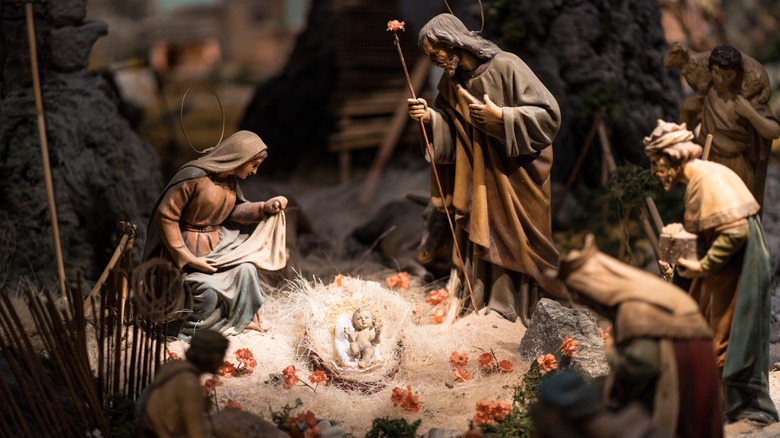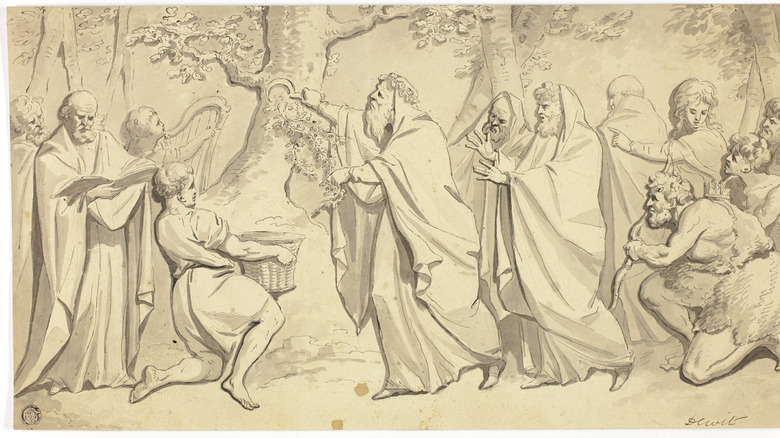The Mystery Surrounding Jesus' Birth Date
Christians generally celebrate Jesus' birth on December 25, Christmas Day, but in reality, most historians do not think that Jesus was born that day, or, in fact, in A.D. 1, despite that this dating system is named for the birth of Jesus — B.C. stands for "before Christ" and A.D. stands for the Latin phrase "anno domini," meaning "In the year of the Lord," — but that method of measuring the years came some 500 years after Jesus died. And while December 25 is the date most of us grew up with, some Orthodox Christians celebrate Christmas on January 7, while Armenian Christians observe the birth of Jesus on January 6. This is all because no one knows for sure when Jesus was born.
Though historians have some evidence as to when Jesus died — the first Friday of April in either A.D. 30 or A.D. 33 (via the Center of Biblical Studies) — his date of birth is much less certain, simply because, as explained by the Biblical Archeology Society, at the time when the earliest Christian writings were being forged, it was viewed as a low-brow pagan move to record the date of a birth or celebrate "birth anniversaries." In fact, early on, the main focus was on Jesus' teachings and the miracles attributed to him, including his resurrection. In the end, his birthday was likely chosen by early Christians to coincide with Saturnalia, a Roman gift-giving festival celebrated near the winter solstice.
Was Jesus a September baby?
Today, historians and religious scholars believe that the historical Jesus was born in Bethlehem at some time between 6 and 4 B.C. since the biblical account of his birth is closely associated with the Judean King Herod, who died in 4 B.C.. This means that Jesus died in his mid-30s, which also fits with the description in the Gospel of Luke that Jesus began his brief ministry at about 30 years old. The Gospel of Luke, which includes the most thorough story of Jesus' birth, was likely composed around A.D. 63 to 70, and probably sourced from an earlier account. That said, the Bible doesn't mention the nativity scene that has become so integral to our mental images of Jesus' birth.
The exact day of Jesus' birth is a greater mystery. Some Biblical scholars believe Jesus was likely born in the summer or fall since the Gospel of Luke mentions that shepherds were watching their flocks in fields at the time (by winter, shepherds would have moved their flocks inside). According to Luke, Mary was visited by an angel in the sixth month of her relative Elizabeth's pregnancy with John the Baptist. Since John was conceived in June, that places Jesus's birth in September.
The ultimate public relations move
As people learned more about Jesus' life and death, it was natural that they would be curious about his origins. Around 200 A.D. different Christian sects began to throw out dates, surely with some reasoning for their guesses, but according to the Biblical Archeology Society, at that time no one had yet proposed December 25, and none of the dates stuck. It took 200 more years for a date to be (mostly) settled on in which to celebrate the birth of Jesus Christ.
As previously mentioned, most scholars think that the date of December 25 was chosen around 400 A.D. because it aligned with long-held pagan celebrations in something that could be considered the boss of all PR moves. One theory is that choosing December 25 as the day of the commemoration of Jesus' birth was done to coincide with a time when non-Christians were already in a celebratory mood. This would make it blend more easily into people's comfort zones and maybe even entice some new followers.
Another theory is based on the Roman Emperor Constantine's decision to declare that date the official date of Christmas in 336 A.D. Brittanica posits it was done in an effort to overshadow the pagans' winter rituals and ultimately make the celebration of Jesus' birth the high holiday that it has become today.


